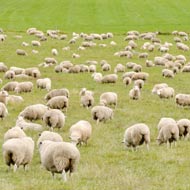
Parliamentary group sets out new recommendations
An increase of dog attacks on livestock is costing farmers millions of pounds and causing great distress, according to a new report.
The All-Parliamentary Group for Animal Welfare (APGAW) report reveals the increasing problem of livestock worrying by dogs and identifies some of the causes. It also sets out a number of recommendations to tackle dog attacks on livestock.
The group included chair Angela Smith MP, Lord de Mauley, an ex DEFRA minister and Neil Parish MP, chair of the EFRA select committee.
Commenting on the report, Neil Parish said: "Most dog owners are responsible and we want to encourage dog walking, but actually the report shows most attacks are caused by unaccompanied dogs.
“The group feels more needs to be done to educate owners of the risk of dog attacks, we need better recording by police forces and better advice needs to be available for farmers to use preventative tools and take low-cost litigation against irresponsible dog owners who are costing their industry.”
The report recommends that more is done to ensure dog owners recognise the risk their dog may pose to other animals. This is so they can take measures to prevent incidents, such as ensuring dogs cannot escape from the home, using the lead where needed and attending training classes.
Other recommendations in the report include:
- farmers and local authorities can take measures to help prevent worrying and attacks. The information around the need to report, how to utilise preventative tools and how to set out clear messaging needs to be delivered consistently to farmers and given authority by farming and landowner organisations
- farmers should report all attacks and worrying to the police
- dog organisations should produce consistent information for dog owners which can be disseminated through veterinary practices and farming organisations
- the Home Office should recognise that livestock worrying is a national social and economic issue which requires accurate statistics to be collected and guidance to be provided to police and should look to make livestock worrying a recordable crime to ensure more accurate records
- Defra should support specific updates to relevant legislation where this is found to be required such as a better definition of ‘livestock’
- the Ministry of Justice should review the sentencing under the Dogs (Protection of Livestock) Act 1953
- all organisations and institutions should look at commissioning research on the root causes of poor dog behaviour.



 The latest
The latest